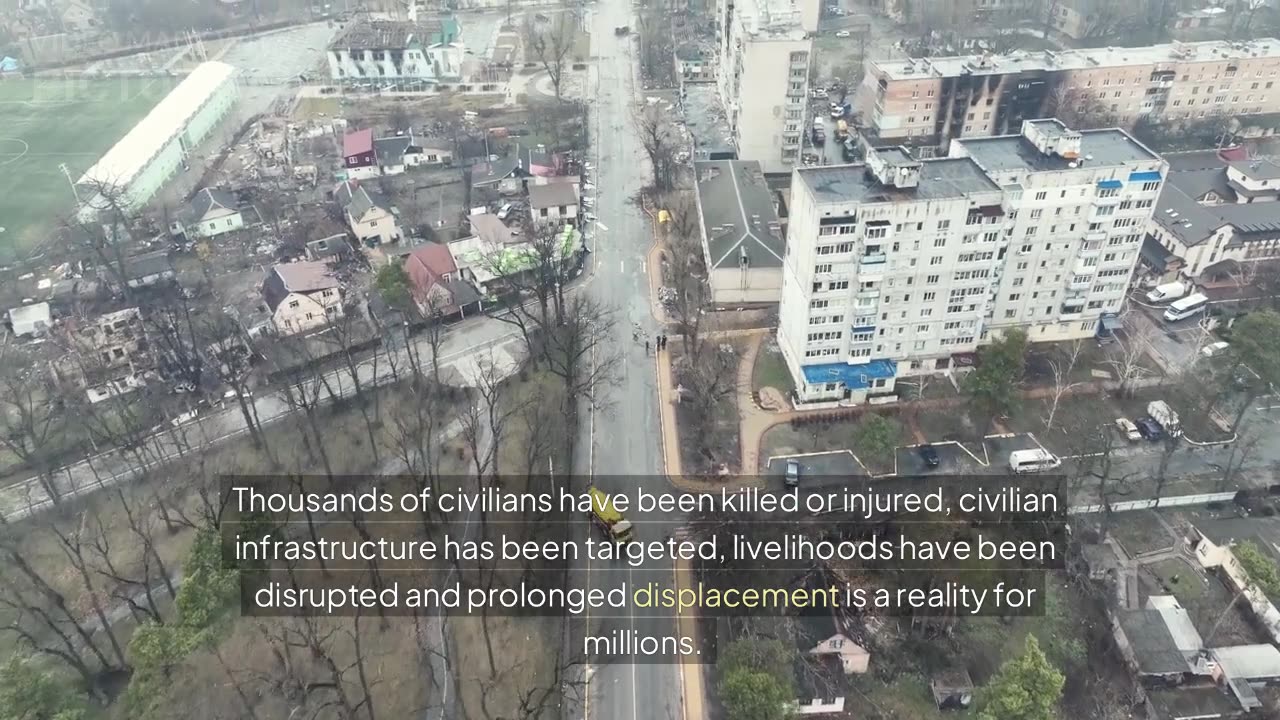Premium Only Content

Armed conflict in eastern Ukraine began in early 2014 following Russia’s annexation of Crimea.
Armed conflict in eastern Ukraine began in early 2014 following Russia’s annexation of Crimea.
On Feb. 24, 2022, Russian President Vladimir Putin announced the beginning of a full-scale land, sea and air invasion of Ukraine.
Throughout 2023, the war continued to have a devastating impact on civilians resulting in significant humanitarian needs. Thousands of civilians have been killed or injured, civilian infrastructure has been targeted, livelihoods have been disrupted and prolonged displacement is a reality for millions. At the tragic two-year milestone since the war’s start, life in Ukraine has been severely impacted in varied and complex ways.
In 2024, 14.6 million people need humanitarian assistance in Ukraine, about 40% of the population. Some 6.3 million people have fled the country and remain refugees, mostly across Europe.
The 2024 Ukraine Humanitarian Needs and Response Plan (HNRP) seeks $3.1 billion which will allow humanitarians to support 8.5 million people. Around 2.3 million refugees and host communities will be supported through the 2024 Ukraine Situation Regional Refugee Response Plan. These plans provide a shared understanding of the impact of the war and identify the most urgent humanitarian needs.
(Photo: Border crossing point in Medyka, Poland. Source: Polish Ministry of the Interior and Administration via Twitter)
Humanitarians began preparing for the onset of winter in Ukraine, around October. Temperatures in winter can drop below -4 degrees Fahrenheit (-20 degrees Celsius), putting millions of people already facing significant challenges in dangerous situations. People taking shelter in displacement centers or people in communities near the frontline, living in damaged homes or without access to heating, are particularly at risk.
Winter attacks by Russia on Ukraine’s infrastructure began in October 2023 and have been persistent. On Dec. 29, 2023, Russia launched more than 120 missiles, killing 30 civilians and leaving families cut off from water, heating and electricity. Such attacks are a direct violation of international humanitarian law, which prohibits any attacks that destroy critical resources and threaten civilian survival.
On March 16, 2023, the Independent International Commission of Inquiry on Ukraine said, “Russian authorities have committed a wide range of violations of international human rights law and international humanitarian law in various regions of Ukraine, many of which amount to war crimes.”
In a statement ahead of the war’s two-year mark, the UN Human Rights Office said, they have documented “a number of violations committed by Ukrainian military and security forces, albeit a fraction of the scope of those perpetrated by Russian forces.”
UN Human Rights Chief Volker Türk renewed his call on the Russian Federation to cease immediately its continuing armed attack on Ukraine, further to its obligations under international law and the UN Charter, and emphasized the urgency of achieving a just peace.
Some Ukrainian organizations struggle to secure much-needed financial support. Local humanitarian leaders and organizations know their community needs best and building trust with these organizations is key. CDP’s initial round of grants from its Ukraine Humanitarian Crisis Recovery Fund includes investments in Ukrainian organizations. CDP’s Localization issue insight describes the importance of locally-led humanitarian response and what philanthropy can do to improve their localization practices.
-
 1:20:41
1:20:41
TRAGIKxGHOST
2 hours agoTrying to get SCARED tonight! | Are You SCARED!? | Screams Beyond Midnight | Grab a Snack
11.5K2 -
 LIVE
LIVE
StuffCentral
4 hours agoI'm baaack (no you can't play with me.. unless you a healer)
150 watching -
 2:25:11
2:25:11
TheSaltyCracker
5 hours agoTrump Is Not Dead ReEEeStream 8-31-25
70.9K109 -
 3:09:16
3:09:16
THOUGHTCAST With Jeff D.
4 hours ago $0.67 earnedLabor Day Weekend FORTNITE With THOUGHTCAST Jeff & the squad
17.5K4 -
 3:44:05
3:44:05
Rallied
6 hours ago $4.00 earnedSolo Challenges All Day
44.3K1 -
 LIVE
LIVE
iCheapshot
7 hours ago $0.20 earnedCall of Duty: Black Ops Campaign
41 watching -
 4:39:16
4:39:16
Meisters of Madness
8 hours agoMadness in a Pod
7.59K1 -
 1:25:44
1:25:44
HELMETFIRE
4 hours ago🟢GAMING WITH FIRE EP9🟢
7.91K -
 1:24:08
1:24:08
Jean-Claude@BeyondMystic
15 hours ago🌀 THE WACKY WOO SHOW 3I ATLAS ALIEN INVASION with DICK ALLGIRE & JC - AUG 31 , 20254
50.7K65 -
 2:26:21
2:26:21
vivafrei
15 hours agoEp. 279: Patel's GF Sues for Defamation! Rogue Judges vs. Trump! Raja Jackson, Kick Stream & MORE!
146K83